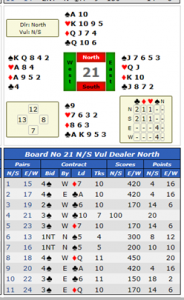
I was Director at a recent session, but am still in training, and would be grateful for your advice on this hand. We were playing duplicate pairs and a two-winner Mitchell movement. This hand was played on the first round at Table 10 by four comparatively inexperienced players. On round 2, sitting at Table 9 the hand came to me next. Our EW opponents were two experienced players including a trained and experienced director.
Looking at the Bridgemates after we had played it, we were all dubious about the result which had been entered at the previous table. Our reaction was that the cards must have got muddled. We agreed to let everything stand and check the hands against the deal file at the end of the session. We subsequently found that the hands were correct and had not been muddled on the first round. The result was allowed to stand, but on later reflection I believe that Clubs instead of Spades had been entered by North at Table 10 on the first round, and this had been missed by East/West (leaving aside for the moment the whole question of whether it really was 11 tricks making rather than, say, 10).
A number of players have difficulty in distinguishing the icons for Spades and clubs (and indeed Spades and Hearts) on the Bridgmates, including myself.
In short, I think the error was a typographical error, but no personal hand records had been kept. When a scoring error is made it affects not only the pair in question, but everyone. In this instance Pair 22 (EW) were disadvantaged, so giving all the other EW pairs a slight boost to their scores. Similarly, NS (Pair 10) gained from the error but this causes the scores of all the other NS pairs to be slightly disadvantaged.
Therefore, my question is that when a “typo” has been made on the bridgemates, can it be corrected later? Do the rules give the director any discretion to correct the icons (suits) entered under any circumstances?
I suppose that if I had been more on the ball I would have:
(a) checked the deal file immediately after playing the hand myself to ensure the cards were correct and
(b) gone back to those who played hand 21 on the previous (first) table to ask them to re-check the recorded score.
Mike Ingle – Oswestry Bridge Club
Only the Director or a designated scorer is allowed to alter a potentially erroneous score, subject to approval by the Tournament Organiser (in this case this would be deemed to be your Club Tournament Organiser, or if there isn’t such a designation I would suggest your Club Chairman) (Law 79C2). In his own mind the Director should be reasonably certain that there is an error – this can usually be determined by looking at the hand records (if available). If in any reasonable doubt don’t adjust.
At the time, since it was the second round, you (the Director) should probably have had a word with the pairs on the first play.
It would appear that you have no doubt that there is an error (I agree), but what is the error.
a) in general, have the first two pairs physically switched NS and EW cards after playing them – the hand records will establish this, and in this case this clearly hasn’t happened.
b) a common mistake is to enter the wrong declarer – E or W instead of N or S. Looking at the hand records NS could have played in 3♣ so its possible that 3♣ could be by NS.
c) the Bridgemate operator has entered the wrong suit (clubs instead of spades). My only concern with this is that the buttons for clubs and spades are not adjacent, but during the bidding clubs and spades had probably both been mentioned (highly likely), and that the recorder (usually North) got confused (you say they were inexperienced players).
Since either (b) or (c) is feasible and if you can’t determine which (talking to the players), you then need to look at the number of tricks made and the lead card. It’s virtually impossible for NS to make 11 tricks in clubs, so this would probably rule-out (b). Also the lead card being the ♣6 (by North) leads me to believe that West was the declarer. Hence (c) seems to be the obvious solution (but noting that there is also an error in the person playing the contract – input as East, but the lead card would indicate West – easily done since E and W are on the same Bridgemate button).
(many players find it a chore having to input the lead card, but in investigations like this it can be invaluable)
I would note that since they were inexperienced players and it was the first round, they may not have been aware of a wrong score being generated (thinking 3♠ in fact did equal 150)
But again I would stress that if there is any reasonable doubt, you should leave the score unchanged (in this case there is no doubt that it is wrong, and (c) seems a highly feasible reason). So the Director/Scorer should submit his findings to the Club Tournament Organiser (or Chairman) who would almost certainly agree the amendment to 3♠ by E.
You are perfectly correct in that the symbols can be confused when checking the Bridgemate display. For this reason at our club we prefer ‘character’ input (this can be amended on the BCS Options screen).
Tony